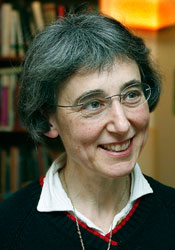 |
 |
|
 |
 |
 |
 |
 |
|
 |
 |
 |
 |

Friday Evening Lecture Series

Photo credit Rosalie Winard
|
 |
|
|
07/02/10
Lillie Auditorium, 8:00 PM
"Fixing My Gaze: A Scientist's Journey into Seeing in Three Dimensions"
Susan R. Barry, Mount Holyoke College
Introduction by Ann Stuart
Lecture Abstract:
For years, neuroscientist Sue Barry taught her students the conventional wisdom that the brain is malleable only during a “critical period” in early childhood. Often she used her own story as an example. Dr. Barry had been cross-eyed since early infancy and could not see in 3D. She assumed that her brain had reorganized itself when she was a baby to avoid double vision, and it was impossible to change brain wiring as an adult. However, at age 48, Dr. Barry consulted a developmental optometrist who prescribed a program of optometric vision therapy. After intensive training, Dr. Barry accomplished what she and other scientists considered impossible: she learned to see in stereo depth and experienced an extraordinary, new view of the world.
Dr. Susan R. Barry is a professor in the Department of Biological Sciences at Mount Holyoke College. She has been cross-eyed and stereoblind since early infancy but gained stereopsis and a remarkable new view of the world in her late forties. Dubbed “Stereo Sue” by Oliver Sacks in a 2006 New Yorker article by that name, Dr. Barry has gone on to write Fixing My Gaze: A Scientist’s Journey into Seeing in Three Dimensions (Basic Books, 2009) which was rated fourth best science book for 2009 by the editors of Amazon.com and selected as one of the best sci-tech books of 2009 by the Library Journal.
Dr. Barry earned a B.A. in biology from Wesleyan University and an M.A. and Ph.D. in biology from Princeton University. She has worked as a research neuroscientist at the University of Miami Medical School, the University of Michigan, and NASA’s Johnson Space Center and has been a member of the faculty of Mount Holyoke College since 1992. Dr. Barry has a long association with the MBL. She is an alumna of the 1977 MBL Neurobiology course, was a Grass Foundation Fellow in 1983, received an MBL fellowship in 1985, and the Kuffler Fellowship in 1987. Dr. Barry served on the MBL Education Committee from 2002 to 2006 and the MBL Science Council from 2003 to 2006. She was the associated director of MBL’s Grass Fellowship program in 1990 and the director of the Grass Fellowship program from 2002 to 2005. Dr. Barry has served on the Board of Trustees for The Grass Foundation, the NIH Task Force on Medical Rehabilitation Research, and the education committee for the International Congress of Behavioral Optometry. She intends to continue her work as an advocate for people with vision disorders and to write a second book on the general subject of rehabilitation strategies.
Dr. Ann Stuart will introduce Dr. Barry. Dr. Stuart is a professor of Cell and Molecular Physiology at the University of North Carolina (UNC) at Chapel Hill. She received her undergraduate degree from Swarthmore College, her Ph.D. from Yale University, and did postdoctoral work at the Harvard Department of Neurobiology and the Physiology Department at UCLA. Dr. Stuart returned to the Harvard Neurobiology Department in 1973 as an assistant, then associate professor, moving to UNC in 1979. An electrophysiologist, she focused her research on the early stages of visual processing in arthropods, particularly on synaptic transmission from their histaminergic photoreceptors. Recently Dr. Stuart co-authored, with her husband John Moore, a set of tutorials in electrophysiology called Neurons in Action. Since 1973 she has returned every summer to the MBL as a principal investigator, library reader, or faculty in the SPINES and Neurobiology courses. In addition, she has served as a trustee, a Grass advisor, and on various standing committees, as well as on a small ad hoc committee that formed the Satellite Club in the 1980s. Currently she is chair of the Committee on Corporation Membership.
|
| |
  |
|
 |
 |
|